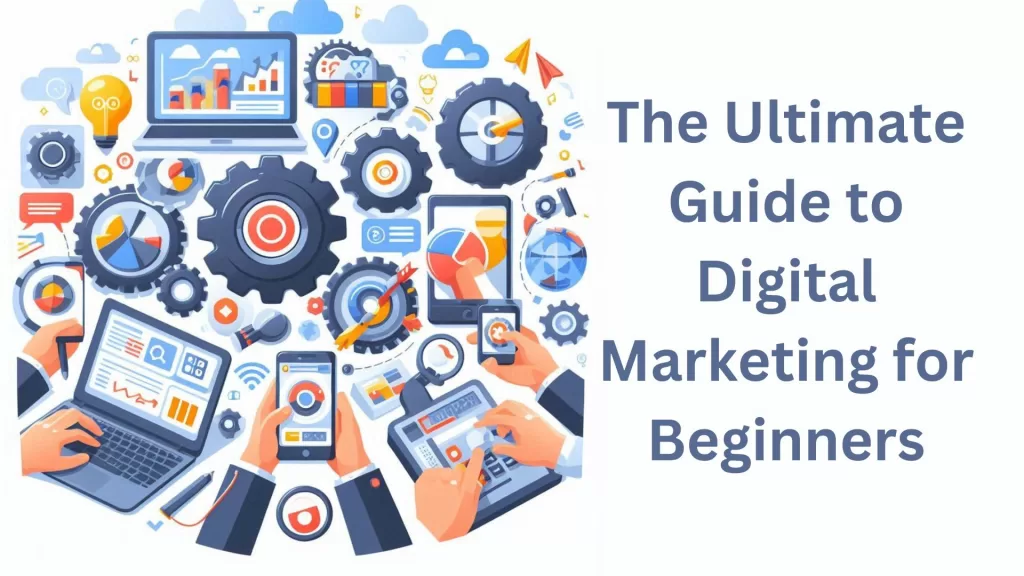Introduction
Digital marketing has transformed the way businesses connect with their audience. For beginners, understanding the various facets of digital marketing is essential to build a successful online presence. The article “The Ultimate Guide to Digital Marketing for Beginners” will provide you with a comprehensive overview of the key components of digital marketing, including essential tools like email marketing services, content creation tools, website themes, and hosting options. Whether you’re starting a blog, an online store, or a service-based business, these tools can help you effectively reach your audience and achieve your marketing goals.
1. Understanding Digital Marketing
Digital marketing encompasses all marketing efforts that use the internet or an electronic device. Businesses leverage digital channels such as search engines, social media, email, and websites to connect with current and prospective customers. Here are the primary components ultimate guide to digital marketing for beginners:
- Search Engine Optimization (SEO): The practice of optimizing your website and content to rank higher in search engine results pages (SERPs).
- Content Marketing: Creating valuable content to attract and engage your target audience, such as blog posts, videos, and infographics.
- Social Media Marketing: Using social media platforms to promote your products or services and engage with your audience.
- Email Marketing: Sending targeted emails to nurture leads and maintain customer relationships.
2. Essential Tools for Digital Marketing
A. Email Marketing Services
Email marketing is one of the most effective ways to engage with your audience and drive conversions. Here are some popular email marketing services that beginners can use:
- Mailchimp: A user-friendly platform that offers various features, including automation, segmentation, and analytics. Mailchimp is ideal for beginners looking to create effective email campaigns without the need for extensive technical knowledge. Sign up for Mailchimp here.
- Constant Contact: Known for its excellent customer support and extensive resources, Constant Contact provides easy-to-use tools for creating and managing email campaigns. It also offers features like social media integration and event marketing. Get started with Constant Contact here.
B. Content Creation Tools
Creating high-quality content is crucial for attracting and retaining your audience. Here are some tools that can help you create compelling content:
- Canva: A graphic design tool that enables users to create stunning visuals, social media posts, and marketing materials. Canva’s drag-and-drop interface makes it easy for anyone to design like a pro. Explore Canva here.
- Grammarly: An essential writing tool that checks your grammar, punctuation, and style. Grammarly helps ensure your content is clear, engaging, and free of errors, which is vital for maintaining professionalism. Check out Grammarly here.
- BuzzSumo: A content research tool that allows you to analyze trending topics and discover what content performs best in your niche. BuzzSumo can help you generate ideas and optimize your content strategy. Try BuzzSumo here.
C. Website Themes and Builders
Your website is the foundation of your digital marketing efforts. Having a professional and user-friendly website is essential for capturing leads and driving conversions. Here are some tools to consider:
- WordPress: The most popular content management system (CMS) globally, WordPress is ideal for building and managing websites. Its flexibility, extensive plugins, and themes make it suitable for various types of websites. Find hosting for your WordPress site here.
- ThemeForest: A marketplace for premium website themes and templates. With a vast selection of themes for various niches, ThemeForest allows you to create a stunning website that meets your business needs. Explore ThemeForest here.
D. Hosting Options
Choosing the right hosting provider is crucial for your website’s performance and security. Here are some recommended hosting options:
- Hostinger: Known for its affordability and reliability, Hostinger offers shared and managed WordPress hosting plans that are perfect for beginners. Their user-friendly dashboard makes it easy to set up your website. Check out Hostinger here.
- Bluehost: A popular choice for WordPress hosting, Bluehost provides excellent customer support and a range of hosting plans to suit different needs. With easy installation and reliable uptime, it’s a great option for beginners. Get started with Bluehost here.
3. Building Your Digital Marketing Strategy
Once you’ve equipped yourself with the right tools, it’s time to develop a digital marketing strategy. Here are some key steps to consider:
- Define Your Target Audience: Understanding who your ideal customers are will help you create targeted marketing campaigns that resonate with them.
- Set Clear Goals: Determine what you want to achieve with your digital marketing efforts, whether it’s increasing website traffic, generating leads, or boosting sales.
- Choose the Right Channels: Based on your target audience, decide which digital channels will be most effective for reaching them. This could include social media platforms, email marketing, or search engines.
- Create a Content Calendar: Plan and organize your content to ensure a consistent flow of information. A content calendar helps you stay on track and allows for better coordination of your marketing efforts.
4. Measuring Your Success
To ensure your digital marketing efforts are effective, it’s crucial to track and measure your success. Here are some metrics to consider:
- Website Traffic: Use tools like Google Analytics to monitor your website traffic, including page views, bounce rates, and user demographics.
- Conversion Rates: Track how many visitors take the desired action on your website, such as signing up for a newsletter or making a purchase.
- Email Open and Click Rates: Monitor the performance of your email campaigns by analyzing open rates and click-through rates. This data will help you refine your email marketing strategy.
These were few points for “The Ultimate Guide to Digital Marketing for Beginners“.
Conclusion
Here is the conclusion of the “Ultimate Guide to Digital Marketing for Beginners”. Digital marketing is an ever-evolving field that requires continuous learning and adaptation. By utilizing the right tools, defining your goals, and measuring your success, you can effectively promote your business online and achieve your marketing objectives. Whether you’re just starting or looking to improve your existing strategy, this ultimate guide to digital marketing for beginners will provide you with the foundation you need to succeed in the digital landscape.




